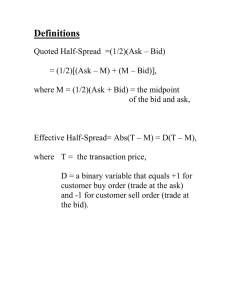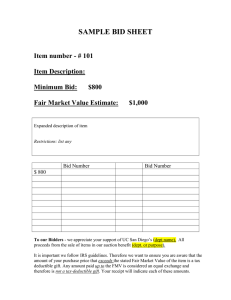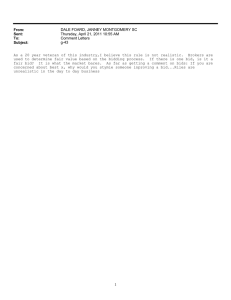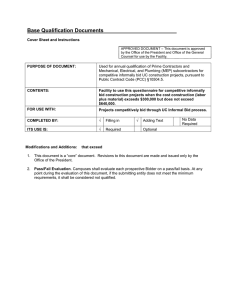Chapter 5 Bidding and Planning for Different
advertisement
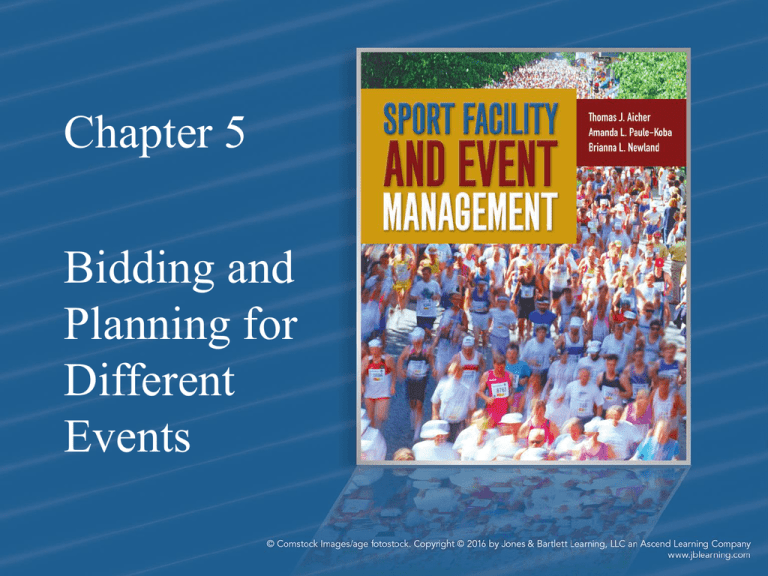
Chapter 5 Bidding and Planning for Different Events Chapter Objectives 1. Write a mission statement that articulates the purpose of the event 2. Define and write SMART goals 3. Assess whether it is feasible to execute an event 4. Explain the event bid process 5. Provide examples of the different types of events Executing Events • Events by their very nature are not permanent. – Occur at different times and in different locations – May occur for different reasons • One of the challenges of running events is that there are many types of events, both sport and non-sport related, that event managers and facility managers might have to execute. • The variety of events that an event or facility manager may have to deal with is vast and can be challenging if one is not prepared for the realities of the different types of events. Identifying Reasons for Creating, Bidding for, or Hosting an Event • Events are held for a variety of reasons. • Some events are created to help a local economy, generate buzz about a new product or sport, or deliver benefits to sponsors/stakeholders. • Events may be run in order to raise money for a charity or philanthropic organization. • Events may be created for the purpose of generating revenue for the organization. • There is the possibility that an event is created with multiple goals in mind. SMART Goals • Specific stands for goals that are well defined. • Measurable goals provide enough detail so the event manager may determine if the goal was achieved. • Attainable means the goals listed are actually capable of being achieved. • Relevant goals make sense given the event that is being produced and resources available to the organizing team. • Time-based goals have a time limit placed upon them. Event Feasibility • Event feasibility examines whether or not the event can be executed at the desired level given the resources at your disposal. • Examining the feasibility will also help the manager determine a budget for the event. • A feasibility study refers to the analysis of the potential event and assesses the strengths and weaknesses of this event. – When conducting a feasibility study, the manager needs to hire the staff necessary to complete the study, plan how the study will be executed, implement the study, write up the results, and distribute the study. The Bid Process • A bid is a competitive process in which the objective is to win the right to organize a specific sporting event. • Event owners, or rights holders, are the individuals or governing body that control the event. • The rights holders are the individuals or groups of people who will ultimately make the decision as to who has successfully won the bid (the right to produce the event). • Not all bid processes are the same. Economic Impact • Economic impact is the amount of new money entering a region that can be attributed to a sporting event or facility. • The economic impacts of spending are composed of direct, indirect, and induced effects. – Direct effects of economic impact include the need to meet the increased demand of visitors for goods and services through actual dollars spent in the local community. – Indirect effects of economic impact refer to the recirculation of the patrons' dollars that were generated through the direct effects. – Induced effects refer to the increase in employment, employment opportunities, and household income that result from the economic activity from the direct and indirect effects. Five Main Types of Events • • • • • Mega-events Recurring events Traveling events Ancillary events Community events Types of Events: Mega-Events • Mega-events are the most complicated type of event to execute. • Often require years of planning to implement and a bid process to gain the rights to host the event. • Often easily identifiable to the general public. • Often a bid process involved in securing the rights to present the event. • Examples: the Olympic Games or the World Cup. Types of Events: Recurring Events • Happen on a regular basis. • “Easiest” type of event to execute because they occur consistently. • Staff is able to understand all of the details of executing the event. • The benefit of recurring events is the event managers know how much food to order for the concession stand, the appropriate number of staff and volunteers needed, the amount of security, timing of the event, and where the signage should be place. • Example: a Friday night football game at a high school. Types of Events: Traveling Events • Occur on a regular basis, but in a different location each year. • The fact that the location varies year-to-year presents a challenge. • The individual or group of individuals who are charged with executing the event are rarely the same. • The organizers are able to contact the previous host sites to identify what worked well for them, what they would do differently, and what, if any, challenges were present at the event. • Example: A NCAA championship event. Types of Events: Ancillary Events • Occur in conjunction with another type of event. • These events can require as much planning as another type of event but the major difference is they are paired with a larger event. • These events can provide additional revenue for the event organizers through ticket sales, merchandise, additional opportunities to sell or increase the price of sponsorships, and a way to involve different target markets. • Example: a Fan Fest at the Super Bowl. Types of Events: Community Events • Smaller in scale and appeal to a specific geographical region. • Local YMCA’s or parks and recreation centers are organizations that often hold community-sporting events for the people who reside within the town. • The event manager sometimes has the freedom to be a little more creative or try different things because it is not occurring on such a large scale. • Example: A holiday 5K race. Hosting Nonsporting Events in a Sport Facility • When you are in charge of a sport facility, there are times when you may have to host nonsporting events in your facility. • These events could vary from a bridal show, a concert, the circus, or a business meeting. • Need adequate up-front planning to account for all the details. – Some of these details may include proper training of the staff, bringing in additional equipment, setting down false floors to cover the basketball court, removing seats, hanging decorations, and so forth. Timelines for Events • Timelines will help keep all of the employees on track and ensure that all tasks are completed in advance. • Ensure each area is accounted for and nothing slips through the cracks. • Event timeline versus day of event timeline.

